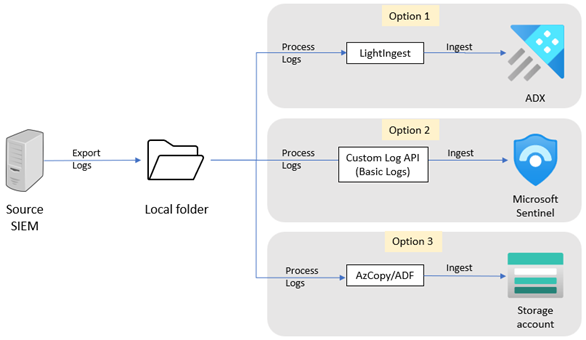Export historical data from Splunk
This article describes how to export your historical data from Splunk. After you complete the steps in this article, you can select a target platform to host the exported data, and then select an ingestion tool to migrate the data.

You can export data from Splunk in several ways. Your selection of an export method depends on the data volumes involved and your level of interactivity. For example, exporting a single, on-demand search via Splunk Web might be appropriate for a low-volume export. Alternatively, if you want to set up a higher-volume, scheduled export, the SDK and REST options work best.
For large exports, the most stable method for data retrieval is dump or the Command Line Interface (CLI). You can export the logs to a local folder on the Splunk server or to another server accessible by Splunk.
To export your historical data from Splunk, use one of the Splunk export methods. The output format should be CSV.
CLI example
This CLI example searches for events from the _internal index that occur during the time window that the search string specifies. The example then specifies to output the events in a CSV format to the data.csv file.You can export a maximum of 100 events by default. To increase this number, set the -maxout argument. For example, if you set -maxout to 0, you can export an unlimited number of events.
This CLI command exports data recorded between 23:59 and 01:00 on September 14, 2021 to a CSV file:
splunk search "index=_internal earliest=09/14/2021:23:59:00 latest=09/16/2021:01:00:00 " -output csv > c:/data.csv
dump example
This dump command exports all events from the bigdata index to the YYYYmmdd/HH/host location under the $SPLUNK_HOME/var/run/splunk/dispatch/<sid>/dump/ directory on a local disk. The command uses MyExport as the prefix for export filenames, and outputs the results to a CSV file. The command partitions the exported data using the eval function before the dump command.
index=bigdata | eval _dstpath=strftime(_time, "%Y%m%d/%H") + "/" + host | dump basefilename=MyExport format=csv
Next steps
Feedback
Coming soon: Throughout 2024 we will be phasing out GitHub Issues as the feedback mechanism for content and replacing it with a new feedback system. For more information see: https://aka.ms/ContentUserFeedback.
Submit and view feedback for